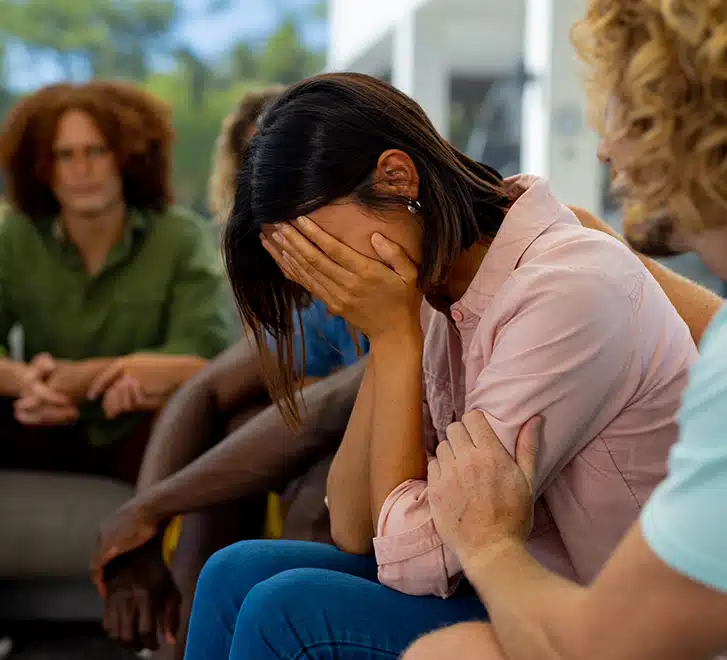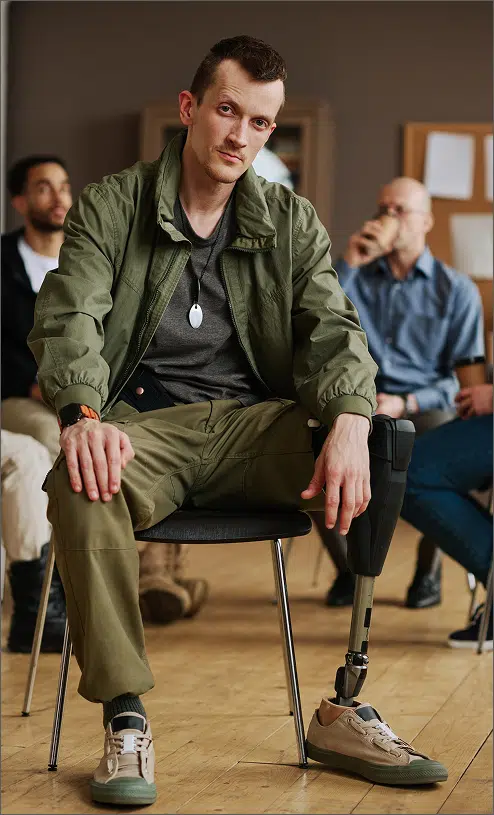Dealing with a Sudden Loss or Sudden Death
Experiencing a sudden death or loss is an indescribably painful experience. Whether you’re attempting to cope with life after a traumatic accident, dealing with chronic pain from an injury, adjusting to a lost limb, or grieving the death of a loved one, we understand that you’re living through a challenging and painful trial through no fault of your own.
Richmond Vona is dedicated to helping injury victims and families process their grief, adjust to their new reality, and set forth on the road to recovery. We’ve assembled this page as a collection of tips, information, and resources for those dealing with a sudden death or loss.


Support After a Traumatic Event
After a sudden traumatic event, such as a car accident, house fire, or natural disaster, it’s important to prepare for the negative impacts the fallout may have on your life. Cultivating supportive resources and relationships, both professionally and personally, can help you adjust and get through this difficult time while prioritizing your mental health and well-being.
The Substance Abuse and Mental Health Services Administration (SAMHSA) has a list of coping strategies for those dealing with trauma, including:
- Avoiding major life changes while adjusting to traumatic impacts
- Taking care of your mind and body, including getting adequate sleep, regular exercise, staying on a routine, and avoiding dependency on drugs and alcohol
- Seeking help and emotional support from friends, family, and support groups
The National Institute of Mental Health also provides tips and resources for responding to trauma and finding mental health care services. The Crash Support Network has a collection of different resources to help victims respond, recover, and take legal action after a traumatic accident.
It’s difficult to prepare for traumatic events, as they can impact your life in deep and unexpected ways. What unites all of these strategies and resources is their ability to help you respond and adjust to sudden change, allowing you to focus on processing the trauma and recovering.
Dealing with a Sudden Death
Grief can be excruciating, even for anticipated losses. The sudden death of a loved one, whether it’s a family member, friend, or pet, can have devastating emotional impacts that significantly reshape your life.
With no time to prepare for the loss, coping with sudden death is an incredibly difficult journey. Some tips and suggestions for processing your grief include:
- Maintain close relationships. Grief can make you want to self-isolate, but support from loved ones is key to your continued emotional health.
- Feel what you’re feeling. A sudden death can initially cause you to feel numb and in shock. When the emotions hit, they can come in a wide range—sadness, guilt, anger, disbelief, anguish—and not always in an order you expect. It’s important to meet your mind where it’s at and not stifle the complex feelings you experience.
- Focus on small steps. Processing grief while dealing with the impacts of a sudden death can be overwhelming. Try to prioritize small adjustments to things within your control instead of forcing yourself to make big changes while mourning.
- Find a way to discuss your emotions. If you’re uncomfortable talking about how you feel with your family and friends, consider seeing a therapist or visiting a support group to help process your grief. You may find comfort in shared experience.
- Take your time. Mourning isn’t a race, and it can take a long time to feel ready to move on. Take care of yourself and allow yourself to feel your emotions for as long as you need to.
- Say your goodbyes. Sudden deaths often steal closure away from those left behind. Whether it’s a funeral, memorial, mental conversation, or some other personal ritual, it’s important to allow yourself to have a meaningful final experience with your loved one.
Resources for Those Dealing with Death
- The University of Michigan has a collection of support resources and content related to processing grief, including online communities and podcasts.
- Winston’s Wish offers bereavement support for children, young people, and families dealing with a sudden death. Conversely, the Sudden Unexplained Death in Children Foundation helps parents, grandparents, and siblings deal with the loss of a child.
- Crash Support Network has a guide to helping family members adjust to their grief after a fatal car accident.
- The Center for Grief Recovery and Therapeutic Services maintains a list of helpful websites for coping with a sudden death.
Adjusting to an Amputation
Losing a limb can add difficulty and stress to many aspects of daily life, including driving, that never required a second thought. Whether it’s from a catastrophic accident, a military wound, or the impacts of an illness, amputation is a brutal experience that others simply cannot fathom. Here are some tips we’ve found for coping with life after amputation:
- Embrace your treatment plan. Physical rehab won’t just improve your mobility and ability to adjust to the new normal. It can also help you deal with the mental health impacts of losing your limb.
- Don’t neglect your emotions. Amputation can impact more than just your physical ability. More than 40% of amputees are at risk for mental health issues like anxiety, post-traumatic stress disorder (PTSD), depression, and substance use disorder, according to Johns Hopkins. It’s important to take care of your mental health and follow other strategies for coping with sudden loss.
- Do your research on prosthetics. A wide variety of prosthetics are available based on which limb you’re missing and how severe your amputation is. If you decide to use an artificial limb, make sure to talk to your doctor about what prosthetics are right for you and what kind of training and work you’ll need to go through to adjust to it.
- Keep up with hobbies. Explore new ways to participate in activities you enjoyed before losing your limb, or look into new ones that your amputation won’t impact. Staying active and engaged can help with your recovery and returning to normalcy.

Resources for Amputees
- PAM Health has a long, thorough guide to coping with life after an amputation.
- The Amputee Coalition provides free services to those dealing with limb loss, as well as educational programs, resources, and a network of hundreds of support groups.
- PrimeCare Orthotics & Prosthetics has a detailed guide to self-care and mental health for amputees.
Support for Chronic Pain After a Sudden Injury
Chronic pain can set in after a traumatic accident and injury, severe illness, or even for no reason at all. The pain can cause you to lose function, suffer a lowered quality of life, and a multitude of other issues.
Chronic pain can weigh on your day-to-day existence and is difficult, expensive, and time-consuming to manage. Having the resources and support you need to cope is important. Here are some strategies and tips for dealing with chronic pain:
- Consider physical therapy. If your pain is interfering with your physical mobility or ability to participate in daily activities, starting physical therapy early can help you regain function and potentially ease your pain. Regular exercise can also help you reduce stress and relieve pain.
- Reduce stress. Stress and other mental problems can make chronic pain worse. Experimenting with meditation, deep breathing, and relaxing music can help put you at ease. Participating in activities you enjoy can also help relieve stress and distract you from your pain.
- Make healthy choices. While chronic pain may drive you to find comfort where you can, it’s important to prioritize your health to avoid worsening your pain. Alcohol and tobacco can interfere with your recovery, while eating healthy, staying active, and thinking positively can help you heal.
Resources for Chronic Pain Sufferers
- The U.S. Pain Foundation’s Pain Connection program offers monthly and weekly support groups open to participants across the country.
- Pathways hosts a list of chronic pain helplines serving residents of different countries across the globe.
- Chronic Pain Anonymous hosts a series of remote and in-person support meetings, with some open to all participants and some for more specific demographics and focuses.
- Mental Health America has a guide describing conditions commonly associated with chronic pain and how it presents in those who suffer from them.
Managing Finances
No one wants or deserves to think about money when they should be grieving or recovering. Unfortunately, any tragic loss comes with financial complications and additional expenses, especially unexpected ones.
A personal injury attorney can help you obtain a settlement to cover many costs associated with an accident or wrongful death, but even when a financial recovery ultimately covers those costs, the burden borne in the meantime is a hardship money cannot fix.


Medical Expenses
Hospital bills can pile up quickly, especially after an injury that requires extensive care or surgical treatment. Insurance may cover the bulk of these expenses, but in some cases, you could be left with significant medical debt on top of your injury or loss.
Support for Funerals and Burial Costs
Saying goodbye to your loved one is already emotionally devastating, but the immediate cost of paying for their services adds another layer of difficulty. Gathering in mourning to celebrate and say goodbye to your loved one is vital, but depending on their wishes, it can also be quite expensive.
Thankfully, many organizations provide financial assistance to those who need help covering funeral and burial costs:
- Final Farewell and the TEARS Foundation help families who have lost children cover funeral costs and assist with planning.
- KW Cares awards grants of up to $15,000 to help with funeral and burial costs, even helping cover some living expenses for families who have lost their primary breadwinner.
Therapy and Continued Support
Whether you’re dealing with the aftermath of a traumatic accident, healing from an impactful injury, or grieving the sudden loss of a loved one, you will likely need ongoing physical therapy or counseling. Depending on whether you have insurance that will cover them, your therapy bills can add up to a significant burden after numerous sessions.
A loss can also simply place additional strain on an already uncertain financial situation, requiring additional assistance. Some resources that can help with financial uncertainty after a sudden loss include:
- Credit.org helps provide counseling and financial advice to those dealing with the death of a loved one.
- The federal government provides some death benefits for families of military veterans or those in financial need.
- US Bank has a detailed guide for resources and steps to take after losing a loved one.
If You’re Dealing with a Sudden Lifestyle Change After an Accident, Our Team is Here to Help You
At Richmond Vona, we understand the profound impacts a sudden injury or death can have on one’s life. You don’t have to carry that burden alone. Our team is devoted to compassionately and aggressively advocating for the rights of accident victims and their families. We’re ready to go above and beyond to win you the justice and compensation you deserve.
YOUR FUTURE IS WORTH FIGHTING FOR
"*" indicates required fields
